新概念第一册121课
新概念英语第一册课文Lesson121Themaninthehat

⽆忧考新概念频道为⼤家整理的新概念英语第⼀册课⽂Lesson 121 The man in the hat,供⼤家参考。
更多阅读请查看本站频道。
Customer: I bought two expensive dictionaries here half an hour ago, but I forgot to take them with me.Manager: Who served you, sir?Customer: The lady who is standing behind the counter.Manager: Which books did you buy?Customer: The books which are on the counter.Manager: Did you serve this gentleman half an hour ago, Caroline? He says he's the man who bought these books. Caroline: I can't remember. The man whom I served was wearing a hat.Manager: Have you got a hat, sir?Customer: Yes, I have.Manager: Would you put it on, please?Customer: All right.Manager: Is this the man that you served, Caroline?Caroline: Yes. I recognize him now.New Word and expressions ⽣词与短语customern. 顾客forget (forgot, forgotten)v. 忘记managern. 经理servev. 照应,服务,接待countern. 柜台recognizev. 认出本⽂参考译⽂顾客:半⼩时以前我在这⾥买了两本很贵的辞典,但是我忘了拿⾛。
新概念英语NCE1_lesson121-122(共27页)课件

• CUSTOMER: I bought two expensive dictionaries here half and hour ago, but I forgot to take them with me.
• MANAGER: Who served you, sir? • CUSTOMER: The lady who is standing behind the counter. • MANAGER: Which books did you buy? • CUSTOMER: The books which are on the counter. • MANAGER: Did you serve this gentleman half an hour ago,
邮件还没发) • ②I forget sending an email to him.(忘记已经发过
了,邮件已经发出了)
• 3.serve :[sə:v] v. • (1)服务;接待;侍候:
• Are you being served, sir? • 先生,有人为您服务吗?
• A young waiter served them. • 一位年轻的侍者侍候他们进餐。 • (2)供给;摆出(食物或饮料等):
• 2.put it on,戴上它。
• 这里的 it指 a hat,以避免重复。 put on是“戴上”、“穿上”的意思。 假如它的宾语是一个名词,这个名词 可放在 put on之后,也可放在put和on 之间。假如是代词,就必须放在put和 on 之间。如:
• Put on your coat./Put your coat on. 穿 上外衣。但只能说:Put it on. 把它穿 上。
• What time is breakfast served in this hotel? • 这个饭店里什么时候供给早餐?
新概念英语第一册 lesson 121
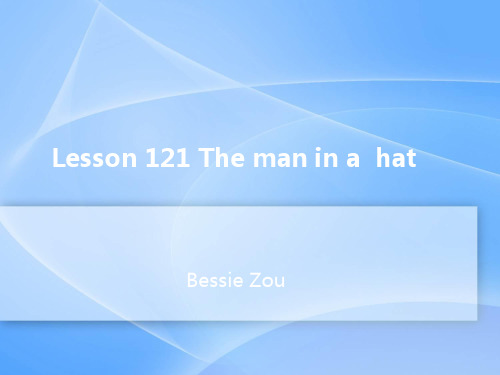
peaked capberetbaseball capWoolen capsunhat▪customer n. 顾客▪forget v. 忘记▪manager n.经理▪serve v. 照应,服务▪counter n. 柜台▪recognize v. 认出▪Customer is god.▪cf: customs▪customs officer (L15)▪forget to do 忘记要做…▪forget doing sth 忘记已经做过…▪①I forget to send an email to him. ▪我忘了给他发邮件了。
▪(忘记要发邮件,邮件还没发)▪②I forget sending an email to him.▪我忘记给他发过邮件了。
▪(忘记已经发过了,邮件已经发出了)▪He is a store manager. ▪他是一位商店的经理。
▪总经理▪general manager▪A young waiter served them.▪I bought the watch at the counter. ▪这只表是我在这个柜买的。
▪I recognize him now.▪我现在认出他来了。
▪Can you recognize this music?▪你能听出这支曲子吗?▪Do you_________(认出) him now ?▪I ______ (忘记) to send an email to him ▪A young waiter _______(服务) them yesterday.▪___________(顾客) is god.▪I bought the watch at the ________(柜台).▪He is a store __________(经理).recognize forget served Customer manager counter▪1.When had he bought the two dictionaries?Half an hour earlier.▪2.Where were the books?They were on the counter.▪3.Did Caroline remember the person who had bought the dictionaries?No, she didn't.▪4.How did she recognize him as the man whom she had served?She recognizes him when he put his hat on.▪Customer: I bought two expensive dictionaries here half an hour ago, but I forgot to t ake them with m e.▪Manager: Who served you, sir?▪Customer: The lady who is standing behind the counter.▪Manager: Which books did you buy?▪Customer: The books which are on the counter.take sth with sb 把某物带走I took some medicine with me when I went to the village.我去那个村庄的时候我随身带了一些药。
新概念第一册121课件

Grammar
定语从句(The Attributive Clause)
as, that 必须以that引导的定语从句的用法
1) 当先行词是 anything, everything等不定代词时 Is there anything in this book that is worth reading?
serve sb right (口语)给某人应得的报应 (惩罚)
e.g. Serve him right. = It serves him right!
(他活该)罪有应得!
serve
v.
照应,
服务,接待
seve
service
n.
e.g.The service in that restaueant is poor. 那家餐馆的服务很差。
即可指人也可指物,在从句中做定语。 Miss Li is the teacher whose house caught fire last year
This is the boy whose mother is our Chinese teacher.
The house whose roof is damaged has now been repaired.
e.g. He forgot his unbrella on the train. 他将伞遗忘在火车上。
e.g. he left his umbrella on the train.
manager
n. 经理
a sales manager 销售经理
manager manage a firm
v. 管理 经营公司
That was the reason why she had changed that much.
新概念1 Lesson 121 课件

She is the girl who met me yesterday.
定语从句
This is the book which I bought yesterday.
定语从句:在复合句中修饰某一名词、代词, 起定语的作用的句子。
She is the girl.
The girl met me yesterday.
The lady served me. The lady is standing behind the counter.
The man who wears the suit is my dad.
The man is my day. The man wears the suit.
This is the book which I bought yesterday.
1. Do you have the experience of buying books in the bookstore?
2. What kind of books do you like to buy?
3. Have you or your parents ever bought something in store but forgot to bring home?
定语从句总结 1. 定义:在复合句中修饰某一名词、代词, 起定语的作用的句子。
2. 跟在先行词后面
3. 三个引导词(who/which/that) Who 指人,作主语 which 指物,作主语 that 指人或物,作主dy who is standing behind the counter.
Lesson 121 The man in a hat
新概念第一册Lesson121
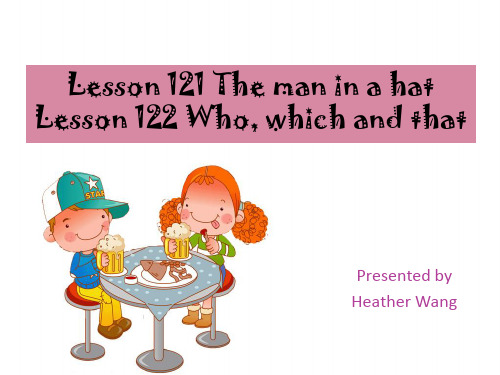
Could you… ? Would you like… ?表示提议 ? Would you like a cup of coffee?
11. recognize sb./sth. (by sth.) 通过某物认出某人/某物
I recognized her by her coat which was red. recognize sb./sth. (as sth.)承认某人/某物(为... ) We all recognized him as the monitor.
Have you got a hat, sir? Yes, I have. Would you put it on, please? All right. Is this the man that you served, Caroline? Yes. I recognize him now. 10. Would you … ?委婉表达请求
窗户很大的那间房子是个教室。 The room whose windows are big is a classroom. 我在找我上周买的那本书。 I am looking for the book that I bought last week. 我昨天给那个住在楼上的医生打了个电话。 I called the doctor who lives upstairs yesterday. 我想买他们昨天卖的那辆车。 I want to buy the carwhich they sold yesterday . 我想买一个可以分期付款的电视机。 I want to buy a TVwhich I can buy on installments 那个头发很长的女的是我们老师。 The woman whose hair is long is our teacher.
Lesson121(课件)新概念英语第一册

• 1. This is the girl. The girl served me.
• 2. This is the book. I bought the book.
Exercises before class:把下列句子合并成一个句子。
• 6. 带着一顶帽子
• 7. put it on
• 7. 把它带上
• 8. all right
• 8. 好吧
• 9. recognize him
• 9. 认出他
Phrases:
• 1. The lady who is standing behind the counter. • 2. The books which are on the counter. • 3. He says that he's the man who bought these books. • 4. The man who I served was wearing a hat. • 5. Is this the man that you served?
• 2. half an hour ago
• 2. 半个小时以前
• 3. forget to do
• 3. 忘记做பைடு நூலகம்事
• 4. take sth. with sb.
• 4. 某人随身携带
• 5. stand behind the counter • 5. 站在柜台的后面
• 6. wear a hat
but I f_o_r_g_o(tftoorgtaekt)ettohteamkewtihthemme. with me.
最新新概念一册第121课件
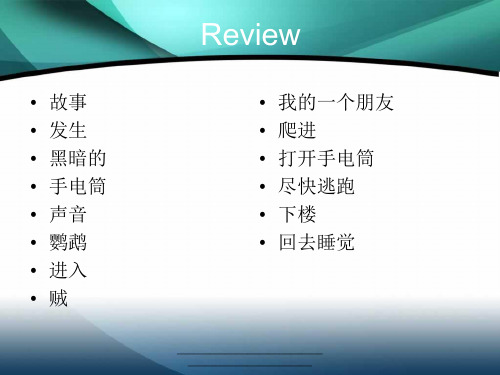
• recognize v. • 1) 认出 • 你能认出他的笔迹吗? • Do you recognize his handwriting? • 2)承认(事实),认清,确认 • 我们都肯定她在舞蹈方面有才华。 • We all recognized her talent for dancing. • 他不承认自己犯下了大错。 • He didn’t recognize that he had made a big
___________________________ _______________________
• 2) 忘记事 • --I forgot my umbrella. 我忘了带伞。 • 他将伞忘在火车上。 • He forgot his umbrella on the train, • = He left his umbrella on the train.
n. 经理 v. 照应,服务,接待 n. 柜台
v. 认出
___________________________ _______________________
• customer n. 顾客(买东西的顾客) • client 银行,律师等的客户 • guest 旅馆的旅客 • passenger 乘客 • a regular customer 老顾客 • 顾客至上。 • The customer is always right.
mistake.
新概念一Lesson121
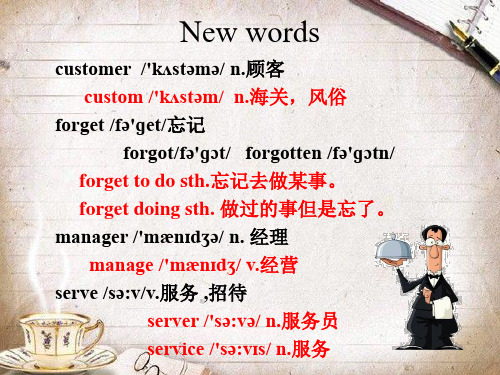
语法小专家 定语从句
定义:由一个句子来充当定语称为定语从句 位置:通常修饰名词,放在被修饰词之后,
一般由关系代词作为引导词,引导词必须放在定 语从句前。 常见引导词: who指人,在从句中作主语; whom指人,在从句中作宾语. (多用who 代whom) that既可指物又可指人; which指物
the counter.
MANGER: Did you serve this gentleman half an hour ago,
Caroline? He says he’s the man who bought these books.
CAROLINE: I can’t remember. The man who I served was wearing a hat.
D. that
A 3. Mount Wuyi ___ lies in the north of Fujian is famous for its mountains.
A. which B. what
C. who D. whose
D 4. This is the book___ I want very much.
CUSTOMER: 那个女士-- 站在柜台后 的那位.
MANGER: 您买的是什么书? CUSTOMER: 就是柜台上的两本书。
天助自助者。
MANGER: 你半小时之前(half an hour ago)接待过这位先生吗, Caroline? 他说他就是买这两 本书的人。
CAROLINE: 我记不起来了。 我接待的那个人 戴着一顶帽子 (wearing a hat)。
A. who B. this
C. it
D. that
新概念一册第121课 课件

② v.(词语)表示……意思 What does…mean?
What does “the green light” mean? The green light means ‘Go on’.
③ v. 意指;意欲 He didn’t mean to hurt you.
must, have to和needn’t
He is offered a job in Canada.
② v. 提出;出(价)
Do you have any good suggestions to offer?
③ v.(主动)表示愿意,提议
He offered to help me.
grow (grew/grown)
① v. 生长;成长
含有at的词组往往都有不礼貌的成分
shout at 朝某人喊 point at 指着某人 laugh at 嘲笑
dream ①en dream at night?
② v. 梦想;幻想
She dreamed that one day she would be a Singer. She once dreamed of becoming a famous Singer.
表示对现在的猜测和推断: He can’t be shaving. He must be having a bath. 。 表示对过去的猜测和推断,用must have been表示肯定的推断, 用can’t have been来表示否定的推断, She can’t have been 29. She must have been 36.
wave n. 波浪 ① v. 招手;挥手示意
He waved us quiet. wave sb. goodbye wave to sb. wave at sb.
新概念第一册-Lesson-121-122 The man in a hat(定语从句)

CAROLINE: Yes. I recognize him now.
Grammar: 定语从句 (attributive clause) 定语从句(形容词性从句),是指一类由关系词 (relative word)引导的从句做主句定语(修饰名词)的句子。 E.g. The boy is Harry Potter. Harry Potter wears glasses. 把上面两个简单句变成复合句要用定语从句,因为第二个句子修饰名词Harry Potter. 定语从句的构成:主句+先行词+关系词+从句 The boy who wears glasses is Harry Potter.
CUSTOMER: I bought two expensive dictionaries here half an hour ago but I forgot to take them with me.
MANAGER: Who served you, sir? CUSTOMER: The lady who is standing behind
先行词关系词 从句 再比如文中:The lady who is standing behind the counter. 这是一个省略句,完整的 句子是“The lady who is standing behind the counter served me. ”其中who is standing behind the counter是一个以关系代词who引导的定语从句,用来修饰名词the
பைடு நூலகம்
customer customer /ˈkʌstəmə(r)/ n. 顾客 (形近词) custom /ˈkʌstəm/ n. 习俗,习惯 (形近词) customs /ˈkʌstəmz/ n. 海关 (联想) merchant /ˈmɜ(r)ːtʃənt/ n. 商人,批发商
新概念一册第121ppt课件
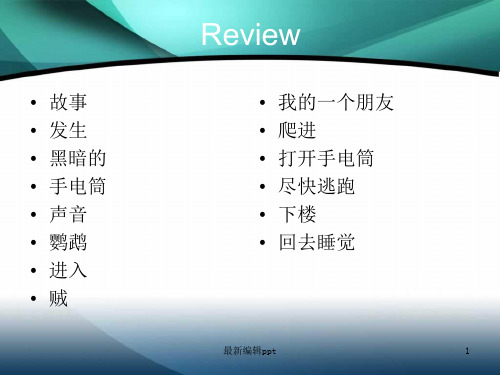
最新编辑ppt
14
• CUSTOMER: I bought two expensive dictionaries here half an hour ago, but I forgot to take them with me.
• MANAGER: Who served you, sir? • CUSTOMER: The lady who is standing behind the counter. • MANAGER: Which books did you buy? • CUSTOMER: The books which are on the counter.
17
课文讲解
• I bought two expensive dictionaries here half an hour ago, but I forgot to take them with me.
• half an hour ago 半小时之前(用在过去时当中) • hour 是以元音音素开头字母,前面的不定冠词用
• The customer is always right.
最新编辑ppt
5
• --forget v. • 1) 忘记 • 我忘了他的电话号码。
• I forget his telephone number. • forget doing 忘记曾做过 • 我永远忘不了在纽约见到他。
• I’ll never forget seeing him in New York. • forget to do 忘记去做 • 别忘了打电话给我。
• service n. • 那家餐馆的服务很差。 • The service in that restaurant is poor. • a charge for service 服务费
新概念第一册121课件

a charge for service 服务费
ccoouunntteerr
n.
1) 柜台 at the jewelry counter 在珠宝柜台 checkout counter 付账柜台 2)柜台式长桌 lunch counter 柜台式长餐桌 3)计算器
recognize
v.
1)认出
e.g. Do you recognize my handwriting? 你能认出我的笔迹吗?
2)承认(事实),认清,确认
e.g. We all recognized her talent for dancing. 我们都承认他在舞蹈方面有才华。
e.g. He didn't recognize that he had made a big mistake. 他不承认自己犯下了大错。
定语:用来修饰、限定、说明名词 (或代词)的特征的。
e.g. Don't forget to go to the forest cabin and let it all hang out on holidays.
别忘了在假日去森林小木屋完全放松一下。
forget v.
2)忘记带 (买、做)
e.g. I forgot my umbrella. 我忘了带伞。
?Mrs. Read is the person to whom you should write.
?The people with whom I am staying are very kind.
Grammar
定语从句(The Attributive Clause)
?限制性定语从句 (由关系代词引导的) 2. whose
即可指人也可指物,在从句中做定语。 ?Miss Li is the teacher whose house caught fire last year
新概念英语第一册Lesson121Themaninahat

[词汇](6)customer n. 顾客forget v. 忘记manager n. 经理serve v. 照应,服务,接待counter n. 柜台recognize v. 认出★forget v. 忘记forget to do sth. 忘记去做某事I have forgotten to bring my book.forget doing sth. 忘记做了某事I will never forget finding that rare coin in my garden.★serve v. 照应,服务,接待① v. 服务;接待;侍候Are you being served, sir? 先⽣,有⼈为您服务吗?② v. 供应;摆出(⾷物或饮料等)What time is breakfast served in this hotel? 这个饭店⾥什么时候供应早餐?③ v. 为……服务/服役;任职The old cook has served the family for 30 years. 这位⽼厨师已为这家⼲了30年了。
He began to serve in the Navy in 1960. 他从1960年起开始在海军服役。
★recognize v. 认出① v. 认出;认识Can you recognize this tune? 你能听出这⽀曲调吗?② v. 承认;确认I recognize that he is more capable than I am.我承认他⽐我更有能⼒。
They recognized Richard as his lawful heir. 他们确认理查德为他的合法继承⼈。
Are british medical qualifications recognized in other European courntries?英国的医⽣执照在欧洲其他国家能否得到承认?[语法]定语从句定语从句像形容词⼀样起修饰作⽤,但位于所修饰的名词之后。
新概念英语第一册单词第121课:戴帽子的男士

customer ['kʌstəmə] n.顾客【单词扩充】client客户 frequenter常客 habitue常客【单词例句】A: Why do you pull a long face?A:你为什么拉长着脸?B:I have just lost an important customerB:我刚刚丢掉了⼀个重要的客户。
forget [fə'get] 忘记【派⽣词】forgetful健忘的【单词搭配】forget to do sth.忘记做某事 forget about忘记【单词例句】A: Don't forget to take the box with you when you go back.A:你回去的时候别忘了带上这个盒⼦。
B: Thanks for reminding me.B:谢谢你提醒我。
manager ['mænɪdʒə] 经理【单词扩充】director经理【单词搭配】generalmanager总经理 deputy manager副经理【单词例句】A: Our manager wishes to call on you at ten tomorrow morning.A:我们经理想在明天早上10点拜访您。
B: Let me check my schedule first.B:让我先查查我的时间表。
serve [sɜːv] v照应,服务,接待【派⽣词】service服务 servlng服务【单词搭配】serve as担任【单词例句】A: Please let us know if you have something. We'll go any length to serve you.A:有什么事请及时告诉我们,我们会不遗余⼒地为您服务的。
B: I'm glad to hear that. Thank you.B:听你这么说我很⾼兴,谢谢。
新概念一册121到130课原文及译文
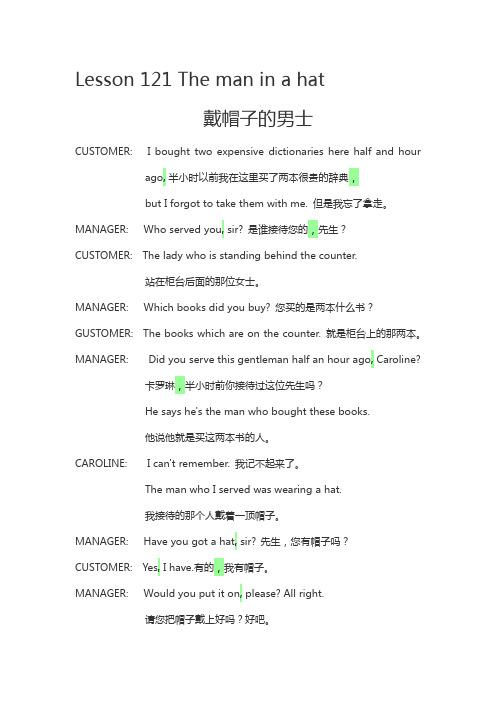
Lesson 121 The man in a hat戴帽子的男士CUSTOMER: I bought two expensive dictionaries here half and hour ago,半小时以前我在这里买了两本很贵的辞典,but I forgot to take them with me. 但是我忘了拿走。
MANAGER: Who served you, sir? 是谁接待您的,先生?CUSTOMER: The lady who is standing behind the counter.站在柜台后面的那位女士。
MANAGER: Which books did you buy? 您买的是两本什么书?GUSTOMER: The books which are on the counter. 就是柜台上的那两本。
MANAGER: Did you serve this gentleman half an hour ago, Caroline?卡罗琳,半小时前你接待过这位先生吗?He says he's the man who bought these books.他说他就是买这两本书的人。
CAROLINE: I can't remember. 我记不起来了。
The man who I served was wearing a hat.我接待的那个人戴着一顶帽子。
MANAGER: Have you got a hat, sir?先生,您有帽子吗?CUSTOMER: Yes, I have.有的,我有帽子。
MANAGER: Would you put it on, please? All right.请您把帽子戴上好吗?好吧。
MANAGER: Is this the man that you served, Caroline?卡罗琳,这就是你接待过的那个人吗?CAROLINE: Yes.I recognize him now. 是他。
- 1、下载文档前请自行甄别文档内容的完整性,平台不提供额外的编辑、内容补充、找答案等附加服务。
- 2、"仅部分预览"的文档,不可在线预览部分如存在完整性等问题,可反馈申请退款(可完整预览的文档不适用该条件!)。
- 3、如文档侵犯您的权益,请联系客服反馈,我们会尽快为您处理(人工客服工作时间:9:00-18:30)。
Would you put it on,please
put on 带上,因为it是代词,所以必 须放在put和on中间,但如果是名词 或者名词词组,则可以放到后面。 例:put on your glasses put on your shoes
限制性定语从句
定语从句,一个简单句跟在一名词或代词 后进行修饰。由关系代词引导的定语从句: who,whom,that,which who/whom指代人或是有生命的动物 例:he says he's the man who bought these books. The man who i served was wearing a hat. He is the man whom i saw yesterday.
The lady who is standing behind the counter.
who 谁,引导了一个定语从句,用来 解释说明the lady。 is standing 现在进行时
The books which are on the counter.
which 哪一个,引导了一个定语从句, 用来解释说明 the books
which修饰的表示事物的名词或代词。 the books which are on the counter. the package which you are carrying is green.
that既可以修饰人可以修饰物o see? He is the man whom/that i saw yesterday. the package which/that you are carrying is green.
counter 柜台 count 数数
I bought two expensive dictionaries here half an hour ago,but i forgot to take them with me.
ago 一般过去式标志词 forget to do sth 忘记要去做某事(未 做) forget doing sth 忘记做过的事 (已做) take sth with sb 随身带上某物
lesson121 The man in a hat
customer 顾客 passenger 乘客 guest 旅游的旅客 custom 海关,习俗,风俗 forget 忘记 remember 记得
manage 管理 serve 照应,服务 service 服务
servant 佣人,奴隶 survive 幸存
